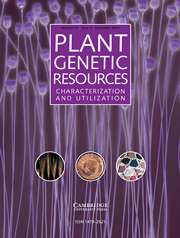Article contents
Genetic combining, heterosis analysis for horticultural traits in tomato (Solanum lycopersicum L.) using ToLCV-resistant lines and molecular validation of Ty genes
Published online by Cambridge University Press: 07 January 2022
Abstract
Tomato is a pivotal vegetable crop worldwide concerning human nutrition, economy and in service to biotechnology. Tomato leaf curl virus (ToLCV) is a begomovirus transmitted through the whitefly (Bemisia tabaci) and is responsible for severe losses in tomato production. In this context, the current investigation was carried out to determine heterotic combiners with high yield, resistance to ToLCV and mode of gene action for economically important traits. For this, 11 prescreened inbred lines were crossed in a half diallel fashion to generate 55 F1 hybrids. The 55 crosses with 11 parents and commercial checks were evaluated for different horticultural traits and resistance to ToLCV. The molecular validation with SCAR markers TG0302 and SCAR1 confirmed the presence of ToLCV-resistant genes in parents and their crosses. The hybrid IIHR-2902 × IIHR-2852 showed the presence of both Ty-2 and Ty-3 alleles in the homozygous state. The estimation of σSCA2 and σGCA2 was significant. It also indicated that the genetic control of target traits was under additive and non-additive gene effects. The values of σA/D2 along with σGCA2/σSCA2 found to be less than unity indicates the preponderance of non-additive gene action in the expression of the studied traits except for percent disease incidence. The parental line IIHR-2919 was the best combiner for fruit and yield traits. The cross combinations IIHR-2913 × IIHR-2898 exhibited significantly higher economic heterosis for yield along with the presence of Ty-2 and Ty-3 genes. The study paves the way for breeding high yielding and ToLCV-resistant hybrids in tomato.
- Type
- Research Article
- Information
- Copyright
- Copyright © The Author(s), 2022. Published by Cambridge University Press on behalf of NIAB
References
- 8
- Cited by


